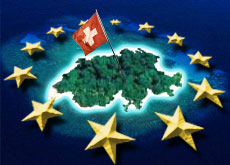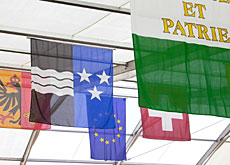Bigger EU prompts second thoughts in Switzerland

With the European Union poised to welcome ten new members on May 1, Switzerland could be forced to reconsider its position on eventual membership.
Switzerland submitted an application to join the Union 12 years ago, but has never officially pursued it.
A recent conference of cantonal governments demanded a clearer European policy at the federal level, with almost half of the 26 cantons saying they were in favour of the country joining the EU.
This year’s Swiss president, Joseph Deiss, has since restated the government line that membership remains the long-term goal. In the meantime the government is pursuing a second set of bilateral treaties with the EU.
The centre-left Social Democrats – one of the four parties in government – are also calling for a reopening of the debate on membership.
But pro-EU campaigners face an uphill battle in convincing a largely eurosceptic electorate of the benefits of joining.
Fears that membership could undermine Switzerland’s unique system of direct democracy – under which the people have the final say on policy – dominate the thinking of many Swiss, according to political analyst Karin Gilland Lutz.
Eurosceptic
She believes those fears help to foster euroscepticism – a phenomenon that resonates well beyond Switzerland’s borders.
“Throughout Europe, the EU is seen as something big, highly administrative, short on democracy and distant – something that ordinary people do not have an allegiance to in the same way as to their own country,” she told swissinfo.
“In Switzerland this scepticism is blown up somewhat because the use of direct democracy is seen as being threatened by, and incompatible with, EU membership.”
Direct democracy allows the public to have its say on all issues and, as a member, Switzerland could find itself incapable of implementing many EU policy decisions.
Neutrality
Another reason so many Swiss are wary of EU membership is the importance they attach to the tradition of neutrality, according to Aliki Panayides, vice secretary general of the rightwing Swiss People’s Party – the country’s most outspoken opponent of EU membership.
“Membership would require us to sacrifice our independence and neutrality,” she told swissinfo.
“You only need to look at our history to see that our notion of neutrality is different to other countries within the EU that are also neutral.”
Panayides insists that Swiss neutrality would be incompatible with EU membership – an argument that was also used for many years in the campaign to keep Switzerland out of the United Nations.
The Swiss finally consented to join the UN in a nationwide vote in March 2002, and the country became a member five months later.
Incompatible
While Gilland Lutz agrees that neutrality is part and parcel of how the Swiss define themselves, she insists that it is not incompatible with EU membership – as other countries have demonstrated.
“Neutrality means different things in different countries and even within the same country at different points of time,” she says.
“It’s an elastic concept that politicians and members of the public can stretch and bend to fit a particular situation.”
But with nobody really able to predict what impact enlargement will have on the EU itself, British member of the European parliament Diana Wallis believes it could take time for the Swiss to change their attitude and become less eurosceptic.
“It’ll be a testing time for the new, larger EU as a whole,” she said.
“It could well be the case that Switzerland will begin to feel more isolated and left out, and then it’ll be time for the country to think seriously about where it stands on membership.”
swissinfo, Jonathan Summerton
In a nationwide vote in 2001, less than 24 per cent of the electorate supported a proposal to start negotiations on joining the EU.
In December 1992, the Swiss electorate narrowly defeated a proposal on joining the European Economic Area.
In May 1992, Switzerland submitted its application for EU membership – an application that has not been officially pursued since.

In compliance with the JTI standards
More: SWI swissinfo.ch certified by the Journalism Trust Initiative











You can find an overview of ongoing debates with our journalists here . Please join us!
If you want to start a conversation about a topic raised in this article or want to report factual errors, email us at english@swissinfo.ch.